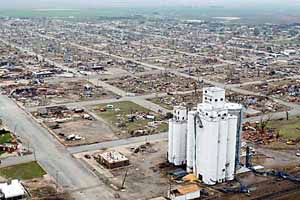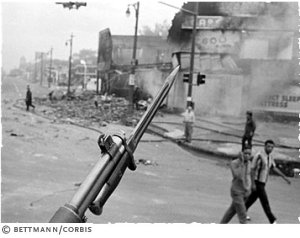Last weekend, a small group of anarchist mutual aid workers from Lawrence, Kansas traveled to Greensburg, which had been almost entirely destroyed the weekend before that by a powerful tornado. What they found was a town completely devastated by a natural disaster, which is now being hurt, not helped, by official government relief
efforts. Just as happened with Katrina in New Orleans, they faced the sickening sight of government agencies forcing residents to desert their own homes, turning away independent relief volunteers at bayonet-point, and devoting most or all of their own resources to security
and maintaining the continuity of government over a paramilitary-occupied ghost-town. Here’s what Dave Strano of Kansas Mutual Aid had to say about the situation:
Somewhere over the Rainbow: A report from a Kansas Mutual Aid member from tornado devastated Greensburg, Kansas
by Dave Strano
On Saturday May 12, four members of Kansas Mutual Aid, a Lawrence based class struggle anarchist collective traveled to the small South Central Kansas town of Greensburg. Our intention was to go as a fact-finding delegation, to report back to the social justice movement in Lawrence on what exactly was happening in the city.
On Friday May 4, 2007 Greensburg was almost completely destroyed by a F5 tornado. 97% of the buildings in the town of 1500 were destroyed or damaged beyond repair. Nearly every single resident was left homeless, jobless, and devastated. At least eleven people died in the storm, and hundreds of companion animals, livestock, and wild animals were killed as well.
According to the 2000 census, 97% of the population of Greensburg was white, and the median income of the population was a meager $28,000. The city was and still is comprised of overwhelmingly poor, white working people.
Shortly after the tornado, the Federal Emergency Management Agency (FEMA) took control of the recovery efforts in Greensburg. The United Way became the coordinating organization for relief volunteers but, after orders came from FEMA, halted the flow of volunteers into Greensburg. FEMA demanded that Greensburg needed to be secured
before the area could be opened to real recovery efforts.
So, as hundreds of recovery volunteers were told to not come to Greensburg by the United Way, hundreds of police from dozens of Kansas jurisdictions were mobilized to enter the city and establish control.
Reports coming from the recovery effort in Greensburg had been woefully short of information. We made multiple phone calls to the United Way and other aid agencies, and were told repeatedly not to come, that We don't need volunteers at this time.
We were told that if we wanted to help, we should just make a financial donation to the Salvation Army or United Way.
With the experiences of Katrina and other major disasters fresh in our collective conscious, we decided to go anyway, to assess the situation and be able to present a better picture to those people in Lawrence that were rightfully concerned about the effectiveness of the relief efforts.
On the night of Friday May 11, in the spirit of offering solidarity to the working class population of Greensburg, members of KMA traveled two hours to Wichita and spent the night there. A mandatory curfew had been imposed on Greensburg, with no one being able to be in the city between 8pm and 8am. So after a nearly sleepless night, we piled into our vegetable oil burning car and made the final two hour drive to Greensburg, careful to not arrive before 8.
Multiple news agencies had reported that because of FEMA, all volunteers were being denied entry at the checkpoints set up outside the city. As we approached the checkpoint, we became really nervous, and tried to make sure we had our story straight.
We were stopped by an armed contingent of Kansas Highway Patrol Officers. We explained that we had come to help with the relief efforts, and after a quick stare and glance into our car, the officer in charge directed us to a red and white tent about half a mile into the town.
It turned out that on Friday the 11th, a week after the tornado destroyed Greensburg, the Americorps organization was finally given permission to establish and coordinate volunteer recovery efforts. Americorps members from St. Louis had set up their base of operations in a large red and white canopy tent that was also being used a meeting place for the residents of the city.
Americorps volunteers proved to be pretty reliable for information, and good contacts to have made while we were down there. Despite the hierarchical and contradictory aims of the national organization, the Americorps people on the ground were the only people really offering any physical recovery aid to the residents of Greensburg.
The four of us from KMA, signed in to the volunteer tent and were given red wristbands that were supposed to identify us as aid workers. We decided not to wait to be assigned a location to work, and instead to travel around the city on foot and meet as many local people as we could.
Our primary goals were numerous. We intended to analyze the situation and assess how our organization could help from Lawrence. If long term physical aid was needed from us, we had to make contacts within the local populace that could offer a place to set up a base camp. We also intended to find out what happened to the prisoners in the county jail during and after the storm, and what the current procedure for those being arrested was. In a highly militarized city, the police and military were the biggest threat to personal safety.
As we traveled further into the ravaged town, it became clear that the photographs I had seen had not done justice to what truly had happened here. All that could be seen was endless devastation in every direction. There wasn't a single building in this area of the town that had been left standing. The devastation was near complete. Every single house we came across in the first moments we entered the town had completely collapsed. Every single tree was mangled and branchless. Memories of watching post-nuclear warfare movies filled my head as we walked around the city.
This was a post-apocalyptic world. The city was eerily empty for the most part. National Guard troops patrolled in Hummers and trucks. Occasionally, a Red Cross or Salvation Army truck would drive by. Very few residents were there working on their homes.
After a short while, we met with several people evacuating belongings from their home. They told us that FEMA had been there for a week, and that all FEMA could offer them was a packet of information. The packet, however, had to be mailed to the recipients, and they had no mailing address! Their entire house had been destroyed. Their mailbox was probably in the next county. All they were left to do was evacuate what few belongings could be saved from their house, and then pull the non-salvageable belongings and scraps of their house to the curb for the National Guard trash crews to haul away.
No agency in the city besides Americorps was offering to help with the removal of this debris, or the recovery of people's homes. FEMA's mission was to safeguard the property of businesses in the area and offer low interest
loans to property owners affected. The National Guard was on hand along with the local police, to act as the enforcement mechanism for FEMA, while occasionally hauling debris and garbage out of the city.
The only building in the city that FEMA and others were working in or around was the County Courthouse. When we approached this area, we quickly took notice of the giant air-conditioned FEMA tour buses, along with dozens of trailers that were now housing the City Hall, police dispatch centers, and emergency crews.
The media had reported that residents of the city would be receiving FEMA trailers similar to the ones in New Orleans. The only FEMA trailer I saw was being occupied by police.
At this location, we tried to formulate some answers as to what had happened to any prisoners being housed in the county jail during the storm, as well as the fate of the at least seven people that had been arrested since the storm.
Not a single person could offer us a real answer. As of the writing of this article, we are still working to find the answer to that question. We have ascertained that any prisoners that were in Greensburg during the storm were sent to Pratt County Jail immediately after the storm had subsided. However, we still don't know how many people that accounts for, nor do we know the fate of any arrestees in the week since.
Several of the arrestees after the storm were soldiers from Fort Riley that were sent in to secure the town. They have been accused of looting
alcohol and cigarettes from a grocery store. The residents I talked to said that they had been told that the soldiers had just returned from Iraq. Is it a wonder that they would want to get drunk the first chance they could? The social reality of this situation was beginning to really set in. The city was in chaos, not because of the storm, but because of FEMA and the police.
In the immediate recovery after the storm, FEMA and local police not only worked to find survivors and the dead, but also any firearms in the city. As you pass by houses in Greensburg, you notice that some are spraypainted with how many weapons were recovered from the home. This is central Kansas, a region with extremely high legal gun ownership. Of the over 350 firearms confiscated by police immediately after the storm, only a third have been returned to their owners. FEMA and the police have systematically disarmed the local population, leaving the firepower squarely in control of the state.
Later in the day we traveled with an Americorps volunteer that turned out to be the sister of one of the members of the Lawrence anti-capitalist movement. She gave us a small driving tour of the rest of the devastation that we hadn't seen yet, and then deposited us in front of a house of a family that was busy trying to clear out their flooded basement.
Two days of rain had followed the tornado, and with most houses without roofs, anything left inside the house that may have survived the initial storm, was destroyed or at risk of being destroyed. The casualties of the storm weren't just structures and cars... they were memories and loved ones, in the forms of photographs, highschool yearbooks, family memorabilia and momentos. People's entire lives had been swept away by the storm.
We joined in the effort to help clear the basement, and listened to the stories of the storm that the family told us. They explained that they had just spent their life savings remodeling the basement, and now it was gone. It had survived just long enough to save them and some neighbors from the storm.
We removed whatever belongings were left in the basement, and sorted the belongings into five piles. The smallest of the piles by far, as the pile of things that were salvageable and worth keeping. The other piles included one for wood debris, one for metal, one for hazardous waste, and another pile for anything else that needed to be removed. From under one of the piles, a scent of rotting flesh wafted through the air. The family was afraid to look and see what may be hidden under the metal.
As we were preparing to leave the work site after clearing the entire basement, we were thanked heartily by the family and their friends. Next time,
one of them said, bring fifty more with you.
Next time we will. It should be obvious to most by now, that the federal, state, and local governments that deal with disasters of this magnitude are not interested in helping the poor or working people that are really impacted. Only through class solidarity from other working people and working together with neighbors and community members will the people of Greensburg be able to survive and rebuild.
Kansas Mutual Aid is in the midst of organizing a more permanent and structured relief effort. We are continuing to make contacts to secure a base camp for our work. We hope to have things organized and solidified by Memorial Day Weekend when we plan to travel back with as many people, tools, and supplies we can take.
Our goals are three fold:
To provide direct physical relief support to the residents of Greensburg by being on hand to help salvage their homes, and provide any other physical support they ask of us.
To offer solidarity and aid in any future organizing or agitating efforts that will be needed to retain possession of their homes, or to acquire any other physical aid they demand from the government or other agencies.
To provide support and protection of human rights during the police and military occupation of the city. We will work to document arrests and ensure that human rights of arrestees are protected.
If you live in Eastern Kansas, or are willing to travel, we need your help and experience. We also need a laundry list of supplies including:
- Money for fuel for our vehicles
- Respirators and filtered face masks
- Headlamps and flashlights (none of the city has power, and there are a lot of basements that will need to be worked in)
- Shovels, pickaxes, prybars, crowbars, sledgehammers, and heavy duty rakes
- Gloves, boots, goggles, construction helmets and other protective clothing
- First Aid supplies
- Water and Food (non-perishable) for volunteers heading down
- Chainsaws and Gasoline
- Portable generators
- You and your experience
Please, if you have anything you can offer, or want to help in the relief, e-mail us at kansasmutualaid@hotmail.com.
We will be hosting a presentation on Monday May 21st at the Solidarity Center in downtown Lawrence (1109 Mass Street) at 7pm on our experiences in Greensburg, and on our plans to offer relief in the form of solidarity and mutual aid, and not as charity. Please join us if you can.
There seems like there is much more to say, but with the experience fresh in my mind, it's hard to keep typing. Action and organization is
needed more than a longer essay at this moment. In love and solidarity,
Dave Strano
Kansas Mutual Aid member
Lawrence, Kansas
Those of you in the vicinity of Lawrence, Kansas may be interested in attending the information/organizing meeting this Monday at 7:00pm. For those of you who are out of the area, I’ve contacted Kansas Mutual Aid to ask what the best way for us to send money and/or supplies is. I’ll post an update once I get an answer back.


